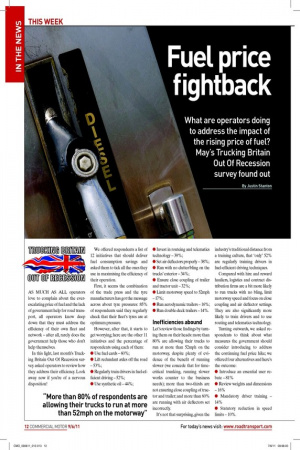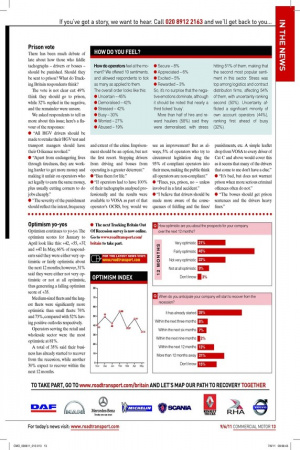Fuel price fightback
Page 10

Page 11

If you've noticed an error in this article please click here to report it so we can fix it.
What are operators doing to address the impact of the rising price of fuel? May’s Trucking Britain Out Of Recession survey found out
By Justin Stanton
AS MUCH AS ALL operators love to complain about the everescalating price of fuel and the lack of government help for road transport, all operators know deep down that they must address the eficiency of their own leet and network – after all, rarely does the government help those who don’t help themselves.
In this light, last month’s Trucking Britain Out Of Recession survey asked operators to review how they address their eficiency. Look away now if you’re of a nervous disposition! We offered respondents a list of 12 initiatives that should deliver fuel consumption savings and asked them to tick all the ones they use in maximising the eficiency of their operation.
First, it seems the combination of the trade press and the tyre manufacturers has got the message across about tyre pressures: 85% of respondents said they regularly check that their leet’s tyres are at optimum pressure.
However, after that, it starts to get worrying; here are the other 11 initiatives and the percentage of respondents using each of them: ● Use fuel cards – 60%; ● Lift redundant axles off the road – 53%; ● Regularly train drivers in fuel-eficient driving – 52%; ● Use synthetic oil – 44%; ● Invest in routeing and telematics technology – 39%; ● Set air delectors properly – 38%; ● Run with no clutter/bling on the trucks’ exterior – 34%; ● Ensure close coupling of trailer and tractor unit – 32%; ● Limit motorway speed to 52mph – 17%; ● Run aerodynamic trailers – 16%; ● Run double-deck trailers – 14%.
Inefficiencies abound
Let’s review those indings by turning them on their heads: more than 80% are allowing their trucks to run at more than 52mph on the motorway, despite plenty of evidence of the beneit of running slower (we concede that for timecritical trunking, running slower works counter to the business needs); more than two-thirds are not ensuring close coupling of tractor and trailer; and more than 60% are running with air delectors set incorrectly.
It’s not that surprising, given the industry’s traditional distance from a training culture, that ‘only’ 52% are regularly training drivers in fuel-eficient driving techniques.
Compared with hire and reward hauliers, logistics and contract distribution irms are a bit more likely to run trucks with no bling, limit motorway speed and focus on close coupling and air delector settings. They are also signiicantly more likely to train drivers and to use routing and telematics technology.
Turning outwards, we asked respondents to think about what measures the government should consider introducing to address the continuing fuel price hike; we offered four alternatives and here’s the outcome: ● Introduce an essential user rebate – 81% ● Review weights and dimensions – 16% ● Mandatory driver training – 14% ● Statutory reduction in speed limits – 10%.
Prison vote
There has been much debate of late about how those who iddle tachographs – drivers or bosses – should be punished. Should they be sent to prison? What do Trucking Britain respondents think?
The vote is not clear cut: 49% think they should go to prison, while 32% replied in the negative, and the remainder were unsure.
We asked respondents to tell us more about this issue; here’s a lavour of the responses: ● “All HGV drivers should be made to retake their HGV test and transport mangers should have their O-licence revoked.” ● “Apart from endangering lives through tiredness, they are working harder to get more money and making it unfair on operators who act legally to earn the same money, plus usually cutting corners to do jobs cheaply.” ● "The severity of the punishment should relect the intent, frequency and extent of the crime. Imprisonment should be an option, but not the irst resort. Stopping drivers from driving and bosses from operating is a greater deterrent.” ● “Ban them for life.” ● “If operators had to have 100% of their tachographs analysed professionally and the results were available to VOSA as part of that operator’s OCRS, boy, would we see an improvement! But as always, 5% of operators who try to circumvent legislation drag the 95% of compliant operators into their mess, making the public think all operators are non-compliant.” ● “Fines, yes, prison, no – unless involved in a fatal accident.” ● “I believe that drivers should be made more aware of the consequences of iddling and the ines/ punishments, etc. A simple lealet drop from VOSA to every driver of Cat C and above would cover this as it seems that many of the drivers that come to me don’t have a clue.” ● “It’s bad, but does not warrant prison when more serious criminal offences often do not.” ● “The bosses should get prison sentences and the drivers heavy ines.”















































